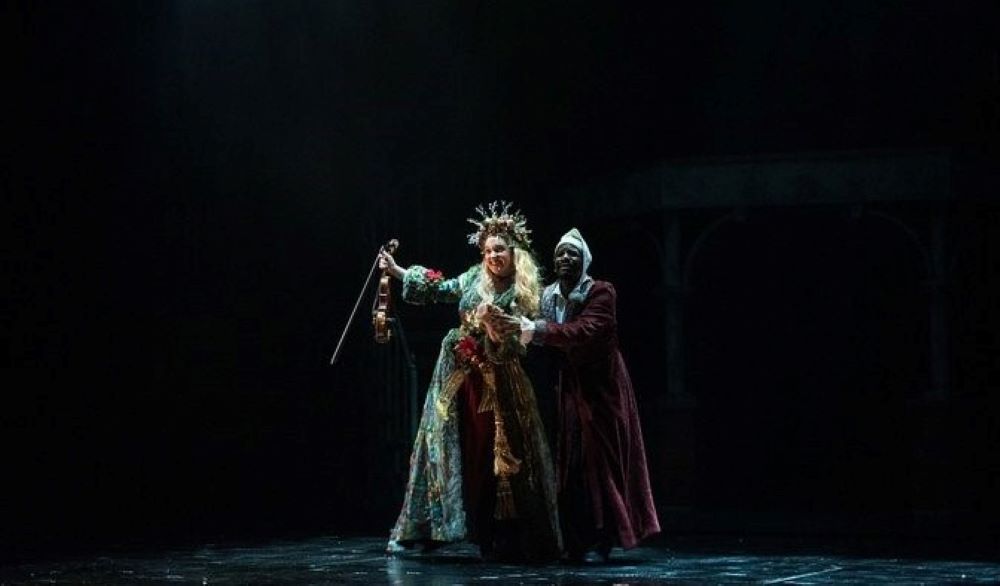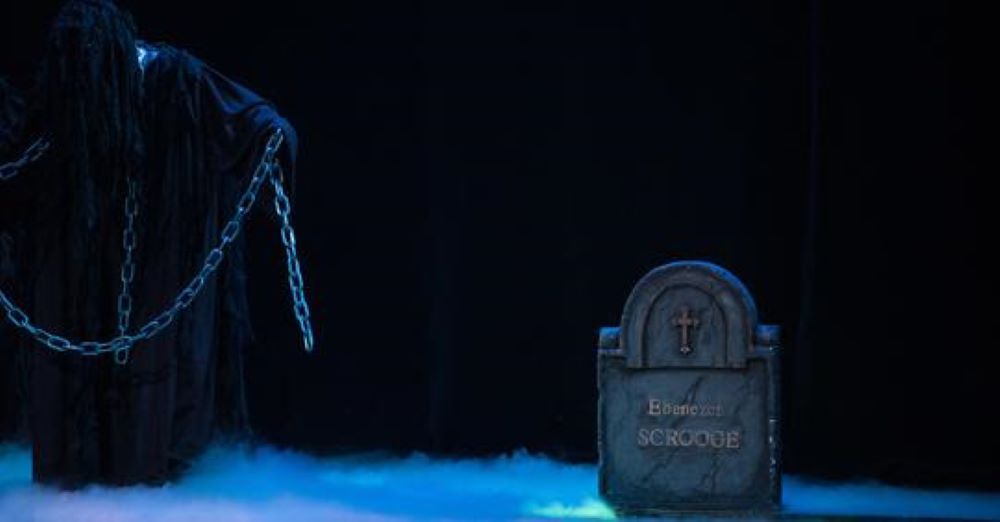
Jennifer Vosters portrays the Ghost of Christmas Present in "A Christmas Carol," presented by Children's Theater of Madison, Wisconsin. (Courtesy of Ross Zentner)
By December 2019, three and a half years after I graduated, my theater career finally had me feeling merry and bright. I had 2020 fully booked before it even started and was wrapping up 2019 with a delightful adaptation of Charles Dickens' A Christmas Carol, in which I played the Ghost of Christmas Present, a joyful, fiddle-playing spirit dressed in shimmering green who guides the miserly Scrooge through the abundant possibilities of the here and now. And at the dawn of a new decade, the here and now seemed promising.
Little did I know that the next show I'd complete onstage would be the same play —two years later.
By spring 2020, I — and millions of others — had lost my job. All my jobs. During that barren year, many artists (including me) questioned not only the viability of an arts career but also the point and purpose. Was anyone willing to fight to keep artists employed, paid, insured, housed? And was it right to put on "Zoom theater" and ask for donations when ICUs were filled to capacity and protests for racial justice were being met with tear gas and clubs?
Those questions lingered without a definitive answer. As 2021 lurched along, theaters — and artists — who could afford to hold on began to reemerge. For some, the unscheduled time off provided fertile ground for change, thanks to the labor of BIPOC-led initiatives, like We See You White American Theater, aiming to end inequity and exploitation in the industry.
Advertisement
It’s the kind of story that makes me believe in my profession again.
A Christmas Carol does everything art is meant to do. It comforts the afflicted parts of us, yearning to believe in goodness and magic and transformation. It afflicts the comfortable parts too, the Scrooge-like parts, by showing us the terrible consequences of indifference. It is a modern morality play with a triumphant end. I can think of no better story to bring to life onstage, especially since it is often the first play — many times the only play — people ever see.
Being part of such a story is what made me want to be an actor. And returning to it after these two years was both deeply meaningful and a little frightening. Here we were, actors and audience, telling the same story, breathing together in the same theater. But we were not the same people.
I was a different person in 2019. Stepping into a role I played then — sitting on the same throne, wearing the same costume, saying the same words — was scary. I couldn't be that Present anymore. Who would this new Present be? Who would I be?
A Christmas Carol draws on Gospel themes: the dangers of greed, the blessings of community, the obligation for generosity, the need for redemption.
In order to be Present, I had to be present. To the story, and to myself: the way my voice sounded now, the way my body moved now, the way the words fit in my mouth now, what the story meant to me now. After all this time and pain.
When I picked up the fiddle and spoke — "Come in, and know me better, man!" — I found a louder, clearer voice rising from deep in my chest, and feet that planted firmly on the ground. I found an edge of impatience, of urgency; a grief, and the ability to sit with that grief. I found a wellspring of joy, with a new dash of confidence now that I'd spent two years building who I was without my career to prop me up. I felt a little less funny, a little less bubbly, but somehow more powerful. Somehow truer. Like the story itself.
Stories guide us the way the Ghosts of Christmas guided Scrooge: to understand the impact of our past; to recognize the joyful possibilities and fierce demands of the present; and to clearly see the consequences in the future. Both onstage and off, the story's radical message to pay attention (or, as Advent reminds us, stay awake!) requires reflection, honesty and faith.

(Courtesy of Ross Zentner)
While not overtly religious, A Christmas Carol draws on Gospel themes: the dangers of greed, the blessings of community, the obligation for generosity, the need for redemption. It reminds us how easy it is to find ourselves fettered like Scrooge and Marley: cloistered in a mindset of scarcity, hoarding our resources, ignoring our neighbors, shunning vulnerability and connection, blaming others for problems we have the power to fix.
But we can cast ourselves in a different role. We can be Present, pointing out the potential of every moment, every day. We can be Fred, who never gives up his optimism and never gives up on his uncle. Or better yet, we can be Scrooge on Christmas morning, who claims his chance at a better version of himself, who acknowledges his sins and immediately does the work to make amends, who gives freely and laughs readily and forges community wherever he goes. The story shows us a different way — many ways — and onstage we see them played out in real time.
It is radical to give of ourselves in times of want, to laugh in times of fear, to connect in times of discord. But Dickens and his characters knew want and fear and discord too. So did Jesus and Mary, Mary Magdalene and the apostles, Paul and Priscilla. Giving, laughter and connection are central tenets of Christmas and Christian life. They are also central tenets of the theater, where we gather to be changed by each other in real time and space. Where we can be present together to witness the same story unfold.
Being Present has offered me the chance to embody — literally — what A Christmas Carol offers us all: the idea that change is salvific; that we are worthy of a second chance; that togetherness can save us in the end. It's the idea at the heart of the Nativity story. And it's the idea that I hope will lead us, artists and audiences, into 2022 with our hearts — like Scrooge's — open wide.








